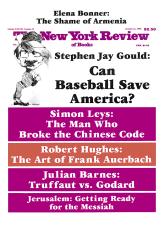In response to:
The Shock of the Old from the July 19, 1990 issue
To the Editors:
In his extremely interesting review of the anthology of articles entitled “Authenticity and Early Music” [NYR, July 19], to which I am a contributor, Charles Rosen reminds us of two very important, often forgotten, points. The first is that before the nineteenth century composers implicitly entertained a much greater distinction between the conception of their music and its realization than since. The second is that much music now performed in public was conceived in terms of private performance settings, or even in terms of none.
Current debate about “historical” or “authentic” performance practice, as a connoisseur of irony like Rosen knows full well, is wholly predicated on modern assumptions about the unity of conception and realization and about the essentially public nature of musical performance.
This being so, how can he, or we, go on accepting the premise that the Early Music movement seeks return to historical styles of performance, or the recapture of bygone sounds, or that it involves any sort of renunciation of the present? “Early Music” is just the late twentieth century’s way of adapting past music to present taste, the way good musicians interested in past music have always done.
What I continue to wonder is why we Early Musickers insist on the paltry claim of historical correctness when we are really accomplishing so much more. (For, you see, I am not “grudging” at all.)
Richard Taruskin
Department of Music
University of California
Berkeley, California
Charles Rosen replies:
Some time ago Professor Taruskin, in a brilliant and provocative article, noted that attempts to revive a style of performance of the distant past often, if not always, made the music more congenial to modern taste. Over the years he has gradually magnified his observation into an absolute principle, which asserts that all claims to historical accuracy are irrelevant. Like most musicians of my generation and of many generations earlier, I have always assumed that the best performances were the result of a compromise between, on the one hand, the demands of modern concert life and the pleasure and expressive needs of the modern performer, and, on the other, a desire to determine the correct text of a piece and the way that it may have sounded and was originally intended to sound.
The Early Music fanatic denies the relevance of anything except a reconstruction of the original sound, although, as Taruskin has pointed out many times, his selection of which aspects of the past to reconstruct is guided by a modern aesthetic. Taruskin, exasperated by such blindness, erects the contrary fallacy and, in the face of a lot of evidence, denies that “the Early Music movement seeks return to historical styles of performance.” At least he appears to say this, but of course he cannot really mean to assert anything that absurd. He must be saying only that Early Music is influenced by twentieth-century ideals. Was that worth saying once again? He convinced us long ago.
In any case, there are aspects of Early Music—both beneficial and vicious—which have little to do with present taste. I do not see how trying to determine what kind of ornamentation Mozart added to slow movements has anything to do with twentieth-century style, or why messing up Haydn’s and Mozart’s two-part counterpoint with an intrusive harpsichord makes it more acceptable to modern ears. A desire for historical accuracy plays a role in most good performances, and a larger role in Early Music for better or for worse than in most others.
As for “a renunciation of the present,” I have not noticed that any of the practitioners of Early Music have made much of a name for themselves by performing any of the works of the late twentieth century which determine the aesthetic to which Early Music is supposed to conform.
This Issue
October 11, 1990



